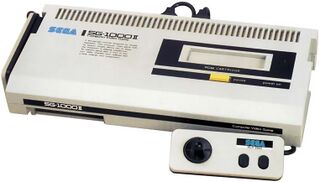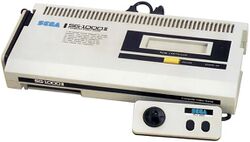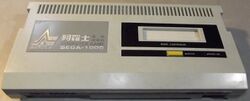Difference between revisions of "SG-1000 II"
From Sega Retro
m |
|||
| Line 13: | Line 13: | ||
The '''SG-1000 II''' is an updated version of the [[SG-1000]] video game console, and was released by [[Sega]] in 1984. It is not a new system per se - internally it is identical to the original SG-1000, though it sports a number of cosmetic changes and largely replaced the original unit. | The '''SG-1000 II''' is an updated version of the [[SG-1000]] video game console, and was released by [[Sega]] in 1984. It is not a new system per se - internally it is identical to the original SG-1000, though it sports a number of cosmetic changes and largely replaced the original unit. | ||
| − | The biggest change was the controller. While the original SG-1000 used a small joystick controller, the SG-1000 II introduced a new thumbstick pad, which was innovative for featuring a stick controlled solely the thumb, though it was digital rather than analog. It was succeeded by the [[Sega | + | The biggest change was the controller. While the original SG-1000 used a small joystick controller, the SG-1000 II introduced a new thumbstick pad, which was innovative for featuring a stick controlled solely the thumb, though it was digital rather than analog. It was succeeded by the [[Sega Mark III]], which significantly upgraded the hardware (including the CPU, [[wikipedia:Graphics processing unit|GPU]] and [[RAM]]) and changed the controller to a more intuitive D-pad design similar to the Famicom. |
==Hardware== | ==Hardware== | ||
| − | Like the original SG-1000, the SG-1000 II runs all [[SC-3000]] games and applications, with the exception of Music and Basic Cartridges. The expansion port has been moved to the front (as it is only used by the [[SK-1100]] add-on), and rather than hard-wiring the first controller, it is detachable like the second. The SG-1000 II also shipped with updated [[SJ-150]] controllers, which can be housed on the sides of the console, a design concept inspired by | + | Like the original SG-1000, the SG-1000 II runs all [[SC-3000]] games and applications, with the exception of Music and Basic Cartridges. The expansion port has been moved to the front (as it is only used by the [[SK-1100]] add-on), and rather than hard-wiring the first controller, it is detachable like the second. The SG-1000 II also shipped with updated [[SJ-150]] controllers, which can be housed on the sides of the console, a design concept inspired by Nintendo's Famicom. Controllers are plugged in to the back of the unit this time. |
The SG-1000 II's outer design would be reused for the [[Sega Mark III]], with a few changes such as the addition of card slot and different placements for the controller ports and power switch. | The SG-1000 II's outer design would be reused for the [[Sega Mark III]], with a few changes such as the addition of card slot and different placements for the controller ports and power switch. | ||
Revision as of 10:31, 4 February 2017

| |||||||||||||||
| SG-1000 II | |||||||||||||||
|---|---|---|---|---|---|---|---|---|---|---|---|---|---|---|---|
| Manufacturer: Sega | |||||||||||||||
|
The SG-1000 II is an updated version of the SG-1000 video game console, and was released by Sega in 1984. It is not a new system per se - internally it is identical to the original SG-1000, though it sports a number of cosmetic changes and largely replaced the original unit.
The biggest change was the controller. While the original SG-1000 used a small joystick controller, the SG-1000 II introduced a new thumbstick pad, which was innovative for featuring a stick controlled solely the thumb, though it was digital rather than analog. It was succeeded by the Sega Mark III, which significantly upgraded the hardware (including the CPU, GPU and RAM) and changed the controller to a more intuitive D-pad design similar to the Famicom.
Contents
Hardware
Like the original SG-1000, the SG-1000 II runs all SC-3000 games and applications, with the exception of Music and Basic Cartridges. The expansion port has been moved to the front (as it is only used by the SK-1100 add-on), and rather than hard-wiring the first controller, it is detachable like the second. The SG-1000 II also shipped with updated SJ-150 controllers, which can be housed on the sides of the console, a design concept inspired by Nintendo's Famicom. Controllers are plugged in to the back of the unit this time.
The SG-1000 II's outer design would be reused for the Sega Mark III, with a few changes such as the addition of card slot and different placements for the controller ports and power switch.
Models
- Main article: SG-1000 consoles.
Technical specifications
History
As the system failed to deliver any meaningful improvements for the Japanese public, the SG-1000 II, like its predecessor, faced stiff competition from Nintendo's Famicom and failed to pick up much steam in that region. As far as we know, it was not released in as many regions as the original SG-1000 - most would jump ahead to the Sega Master System.
Aaronix distributed the console in Taiwan starting in 1986, though the legalities surrounding this release are not yet known. Aaronix produced their own software with this console in mind, often converting games from the MSX (potentially without a license to do so). At least three revisions of the console are known to exist, one without the expansion port.
Games
- Main article: List of SG-1000 games.
Promotional material
JP advert with SK-1100 (1984)
External links
References
- ↑ 1.0 1.1 http://sega.jp/fb/segahard/sg1000_2 (Wayback Machine)
- ↑ http://sega.jp/fb/segahard/sg1000_2/data.html (Wayback Machine)
| Sega SG-1000 Hardware | |
| SG-1000 Variations | SG-1000 | SG-1000 II | SC-3000 | SC-5000 | Othello Multivision | Pasocom Gakushuudzukue | SD-G5 | Arcade |
|---|---|
| Add-ons | Super Control Station SF-7000 | 4 Color Plotter Printer | Data Recorder SR-1000 | Sega Keyboard |
| Game Controllers | Joystick (SJ-200) | Joystick (SJ-300) | Joypad (SJ-150) | SJ-151 | Handle Controller | Bike Handle | Sega Graphic Board | Pasoko-1000 |
| Misc. Hardware | Card Catcher | Extension Cable Kit (JC-100) | SD-80 | Sega Compact Floppy Disk |
| Unlicensed Clones | Dina 2 in one | Fullwis Video Game FR-II |
| Sega Home Video Game Systems | ||||||||||||||||||||||||||||
| 83 | 84 | 85 | 86 | 87 | 88 | 89 | 90 | 91 | 92 | 93 | 94 | 95 | 96 | 97 | 98 | 99 | 00 | 01 | 02 | 03 | 04 | 05 | 06 | 07 | 08 | 09 | 10 | 11 |
|---|---|---|---|---|---|---|---|---|---|---|---|---|---|---|---|---|---|---|---|---|---|---|---|---|---|---|---|---|
| SG-1000 | SG-1000 II | Mega Drive | Mega Drive II | |||||||||||||||||||||||||
| SC-3000 | Mega-CD | Mega-CD II | Genesis 3 | |||||||||||||||||||||||||
| Sega Mark III | 32X | Dreamcast | ||||||||||||||||||||||||||
| Master System | Master System II | |||||||||||||||||||||||||||
| AI Computer | Game Gear | |||||||||||||||||||||||||||
| Saturn | ||||||||||||||||||||||||||||
| Pico | Beena | |||||||||||||||||||||||||||



